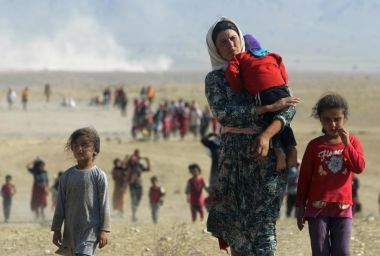US government pledges support for persecuted minorities in Middle East

Every human being has equal value and infinite worth and should have the right to practise their faith, a new White House mandate released yesterday says.
Published to mark Barack Obama's historic meeting with Pope Francis in Washington, the memo sets out initiatives that the President is said to be pursuing in relation to religious freedom across the globe.
"Today the President hosted His Holiness Pope Francis at the White House and thanked him for the ways in which he is inspiring people around the world to embrace justice, mercy, and compassion, particularly toward those who have been marginalized," a statement from the White House said.
"The President and Pope Francis discussed their shared values and commitments on a wide range of issues, including our moral responsibility to provide refuge for people who are forced to flee from their homelands...the conviction that all members of the human family have equal value and infinite worth and should have the opportunity to realize safe and productive futures for themselves; the belief that reconciliation can happen not only between people but also between nations; [and] the conviction that we must secure the unalienable right of all people to practice their faith according to the dictates of conscience, standing against those who would target people for violence, persecution, or discrimination based on their religion."
The mandate specifically addresses the ongoing situation in the Middle East, particularly Iraq and Syria, where Islamic State militants have been targeting minority groups including Christians and Yazidis. The US government has appointed a special advisor for religious minorities in the region, "who will help ensure that the urgent needs of these communities are taken into consideration in our military and humanitarian planning, and our multi-pronged efforts to assist in the return of these communities to their ancestral homes are implemented as expeditiously and efficiently as possible."
The memo says that the promotion and protection of religious freedom is a key objective of US foreign policy, and the administration will "continue to stand for the universal right of all people to practice their faiths in peace and in freedom".
Other issues mentioned in the report include the promotion of climate justice and sustainable development, as well as ending extreme poverty worldwide. "If we marshal our political will, we have the tools, knowledge, and technologies necessary to end extreme poverty within two decades," the mandate says, quoting Pope Francis' recent encyclical on the environment, Laudato Si.
"As Pope Francis says, 'The urgent challenge to protect our common home includes a concern to bring the whole human family together to seek a sustainable and integral development, for we know that things can change...Climate change is a global problem with grave implications: environmental, social, economic, political, and for the distribution of goods. It represents one of the principal challenges facing humanity in our day'."
Executive director of campaign group A Demand for Action (ADFA), Steve Oshana, was invited to the launch of the initiative and Pope Francis' arrival ceremony at the White House yesterday. Speaking to Christian Today from Washington, he welcomed the move towards better protections for minority communities in the Middle East, but warned that so far, not enough has been done.
"At this point, considering the severity of the crisis, I don't know that anything is going far enough. The humanitarian catastrophe is so grand and on such a large scale, what has been done so far hasn't really done anything to solve the longer term crisis," he said.
The initiatives put forward in the memo are "definitely a good step," Oshana added, and they reflect private conversations that representatives from minority communities have had with the White House for some time. Releasing them to coincide with the Pope's visit is "a good opportunity to show that [the government] is serious about these issues," he said.
"In the last year we've definitely seen minorities as part of the conversation in a more meaningful way than we have in the past, especially in the State Department, which traditionally hasn't been good when it came to our issues," Oshana said. The appointment of Knox Thames to the position of special advisor for religious minorities in the near east and south and central Asia "is a sign that the administration is treating our communities as the unique groups that they are," he added.
Of Pope Francis' involvement in raising awareness about persecution in the Middle East, Oshana was overtly positive. That the US government seems to be listening to him is even more "profound and incredibly important," he said.
"The pope has been one of the best champions of human rights and Christian and Assyrian issues in the Middle East," he said. "My only hope is that the President will take his cues going forward from Pope Francis."
The Chaldean Catholic Church is the largest in Iraq, and so many of the Christians in the region are devout Catholics. "Clearly the Pope has a moral authority that is unique to anyone in the world," Oshana said. "It gives our community hope when they hear the spiritual leader of the Catholic people speaking out on their behalf. We are so grateful to his Holiness, and we only hope for more support for our communities from the President."











